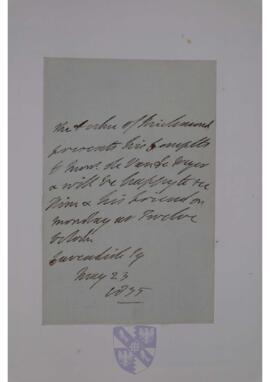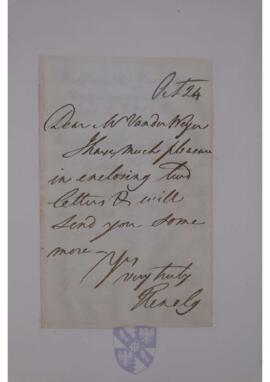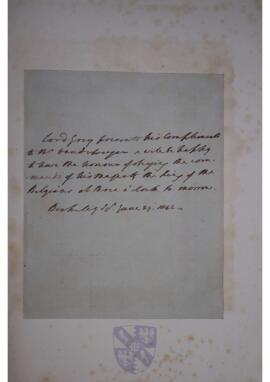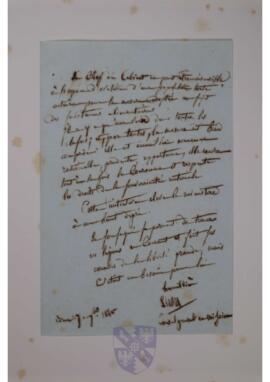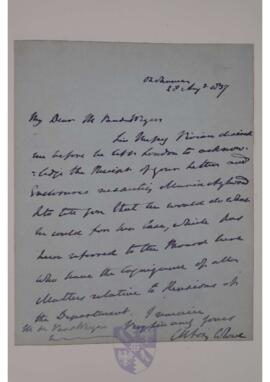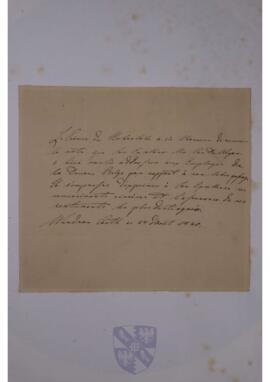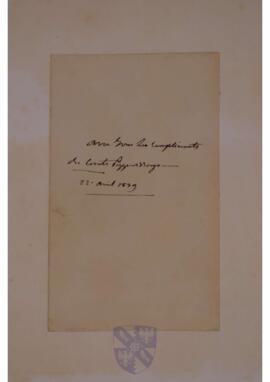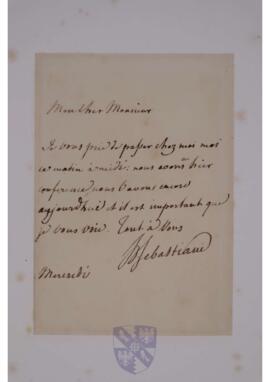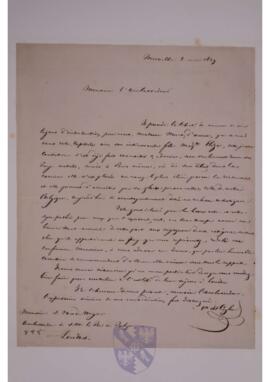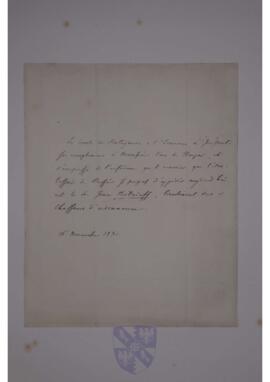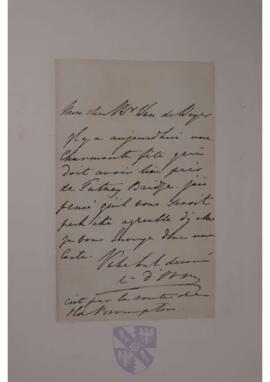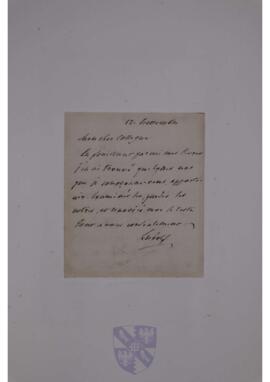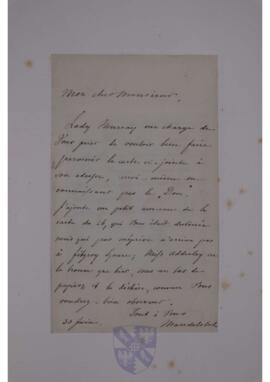Autograph letter addressed from "Cavendish Square", to Jean-Sylvain Van de Weyer offering his compliments and confirming that he will be happy to see him and his friend on Monday at twelve o’clock.
Van de Weyer, Jean Sylvain (1802-1874), diplomatAutograph letter, signed, to Jean-Sylvain Van de Weyer, signed, in which Glenelg encloses two letters and promises to send more.
Van de Weyer, Jean Sylvain (1802-1874), diplomatAutograph letter addressed from "Berkeley Square, London", to Jean Sylvain Van de Weyer, presenting his compliments and reporting to obey the commands of the King of the Belgians the next day.
Van de Weyer, Jean Sylvain (1802-1874), diplomatAutograph letter in French, addressed from "Anvers", signed, to Jean-Sylvain Van de Weyer. The author refers to Elisa Meerti, the singer from Antwerp.
Van de Weyer, Jean Sylvain (1802-1874), diplomatAutograph letter in French, addressed from "Brussels", signed, to Jean-Sylvain Van de Weyer.
Van de Weyer, Jean Sylvain (1802-1874), diplomatAutograph letter in French, signed, to Jean-Sylvain Van de Weyer.
Van de Weyer, Jean Sylvain (1802-1874), diplomatAutograph letter addressed from "Ordnance", signed, to Jean-Sylvain Van de Weyer.
Van de Weyer, Jean Sylvain (1802-1874), diplomatAutograph letter addressed from "12 Pine Apple Place, Edgware Road", signed, to Jean-Sylvain Van de Weyer, asking if King of Belgium may sit for a painting on the subject of the christening of the Princess Royal.
Van de Weyer, Jean Sylvain (1802-1874), diplomatAutograph letter in French addressed from "10 Grosvenor Square", signed, to Jean Sylvain Van de Weyer and Elizabeth Van de Weyer requesting the pleasure of their company.
Van de Weyer, Jean Sylvain (1802-1874), diplomatAutograph letter in French, addressed from "Windsor Castle", presenting his compliments to Jean-Sylvain Van de Weyer, and asking for free passage to Belgium,
Van de Weyer, Jean Sylvain (1802-1874), diplomatAutograph letter addressed from "38 St James’ Place", signed, to Jean-Sylvain Van de Weyer, making arrangements for the two to meet.
Van de Weyer, Jean Sylvain (1802-1874), diplomatAutograph letter addressed from "3 Lowndes Street, Belgrave Square, London", signed, to Jean-Sylvain Van de Weyer, inviting him to meet with White prior to returning to Brussels.
Van de Weyer, Jean Sylvain (1802-1874), diplomatAutograph letter in French, signed, to Jean-Sylvain Van de Weyer, presenting his compliments.
Van de Weyer, Jean Sylvain (1802-1874), diplomatAutograph letter in French, signed, probably to Jean-Sylvain Van de Weyer.
Van de Weyer, Jean Sylvain (1802-1874), diplomatAutograph letter in French, addressed from "Bruxelles", signed, to Jean-Sylvain Van de Weyer.
Van de Weyer, Jean Sylvain (1802-1874), diplomatAutograph letter in French, signed, to Jean-Sylvain Van de Weyer.
Van de Weyer, Jean Sylvain (1802-1874), diplomatAutograph letter in French, signed, to Jean-Sylvain Van de Weyer.
Van de Weyer, Jean Sylvain (1802-1874), diplomatAutograph letter in French, addressed from "4 Georges Hotel", signed, to Jean-Sylvain Van de Weyer.
Van de Weyer, Jean Sylvain (1802-1874), diplomatAutograph letter, signed, to Jean Sylvain Van de Weyer, discussing the improvement of the process of dyeing fabric and asking whether the Belgian government would be interested in this.
Van de Weyer, Jean Sylvain (1802-1874), diplomatAutograph letter in French to Jean-Sylvain Van de Weyer, presenting his compliments.
Van de Weyer, Jean Sylvain (1802-1874), diplomatAutograph letter, signed, to Jean Sylvain Van de Weyer, in French, concerning a fête on Putney Bridge.
Van de Weyer, Jean Sylvain (1802-1874), diplomatAutograph letter in French, signed, to Jean-Sylvain Van de Weyer.
Van de Weyer, Jean Sylvain (1802-1874), diplomatAutograph letter in French, signed, to Jean-Sylvain Van de Weyer.
Van de Weyer, Jean Sylvain (1802-1874), diplomat(1) Newspaper cutting of a letter from C.S. Lewis setting out his ideas on standardised spelling, News Chronicle, 1959
(2) Handwritten letter from C.S. Lewis to Denis Glass, agreeing with his views that the need to reform spelling to make it standardised was unnecessary, 6 Jan 1960
Letter from C.S. Lewis to E.M. Trehern (matriculated in 1933).
It was certainly true that Chaucer's unintended successors valued his other works more then the Canterbury Tales but he had seen more about the Tales in major Elizabethan writers especially those which attacked the Medieval Church which was welcome to Protestants.
He also thought that Chaucer's comic work was better than his serious doggerel. But he might be wrong.
Letter to Mr Searles explaining word choices and passages in Mere Christianity.
Typed letter (signed) from C.S. Lewis to Sir Henry Willink about the offer to take the chair of Medieval and Renaissance English.
Writes to Sir Henry in his capacity as Master of Magdalene College [he was also Vice-Chancellor of the University].
Thanks him for the formula which he would use [Willink suggested the form of words he should use if offered a Fellowship at another College]. A professorial Fellowship at Magdalene was exactly what he would like best. He should like to remain under the same patroness [when was at Magdalen College, Oxford].
Letter from C.S. Lewis to Sir Henry Willink about the offer to take the chair of Medieval and Renaissance English.
Writes to Sir Henry in his capacity as Vice-Chancellor of the University [he was also Master of Magdalene College].
He was more pleased and honoured than he could express at the invitation. The prospect (socially and academically) of migrating from Oxford to Cambridge was an incentive rather than a deterrent. He regretfully had to refuse the invitation due to domestic considerations. He also came of stock that aged early and he was feeling a lack of energy and the first holder of the chair certainly needed energy and vigour. Although he had refused he could be pressed but he didn't want to waste Sir Henry's time.
Typed letter (signed) from C.S. Lewis to Sir Henry Willink about the offer to take the chair of Medieval and Renaissance English.
Writes to Sir Henry in his capacity as Master of Magdalene College [he was also Vice-Chancellor of the University].
He was surprised and apologetic that the master has not received a reply to his letter of 24 June [in which he formally offered him a Fellowship at Magdalene] as he had written a draft and given it to his secretary to be sent by return. He thanks him and his future colleagues. He would be very happy to present himself for a degree by incorporation. It seemed ungracious that he did not come over to Cambridge at once but vivas did not finish until the end of the month and he was due to leave for Ireland on 5 August. He looked forward to coming over when the dear old thing Ordinary Life began again in October and to beginning an acquaintance which he hoped would become a friendship.
Letter from C.S. Lewis to Sir Henry Willink about the offer to take the chair of Medieval and Renaissance English.
Writes to Sir Henry in his capacity as Vice-Chancellor of the University [he was also Master of Magdalene College].
Was moved by Sir Henry's extremely kind letter and his persuasion. He was knocking at his door but he couldn't unlock it because he didn't have the key. His domestic arrangements held him back especially care for his brother who wasn't always in perfect psychological health as he assumed the chair would necessitate living in Cambridge at least during term time.
Looks forward to meeting him when he was next in Cambridge.
